Landing pages play a fundamental role in any digital marketing strategy. The platform you use to create your landing page is essential in ensuring its quality. Nowadays, many businesses make use of Content Management Systems (CMS) to create their websites.
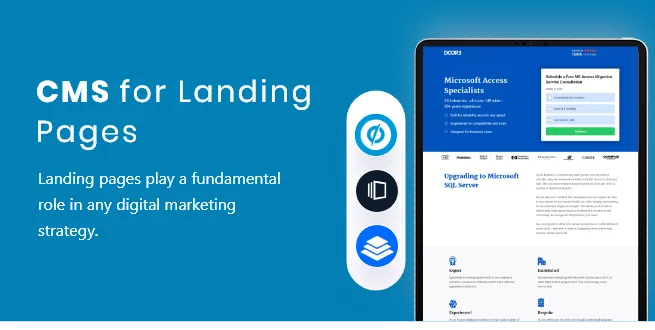
When it comes to landing pages though, many make use of dedicated landing page builders, such as Instapage, Unbounce and LeadPages.
While these platforms have many benefits, including built-in A/B testing functionality, drag-and-drop interfaces and a library of templates to simplify design, a case can be made for using your CMS to create your landing pages.
Even if you use a landing page builder, you can also publish your landing pages through your CMS to integrate the two platforms.
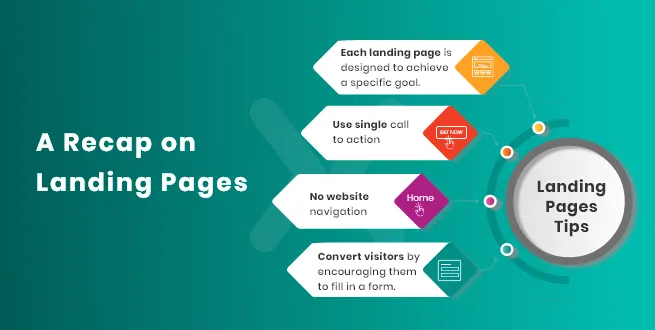
Most digital marketers will have some kind of understanding of what a landing page is - but let’s define them for the purpose of this discussion. Simply put, a landing page is a standalone web page that visitors land on after clicking a link in one of your emails or ads
Essentially, each landing page is designed to achieve a specific goal. They are campaign-specific, with a single call to action, and no website navigation. Also called lead capture pages, the most common goal of a landing page is to convert visitors by encouraging them to fill in a form.
Unlike a regular webpage, which encourages exploration, a landing page is designed to “drive people into the funnel” by giving them two options - fill in a form or click away. This makes landing pages the easiest and most effective way to generate leads.
Content management systems allow users with very little technical knowledge to build functional, good looking websites and easily manage content. This gives businesses more control over their website and allows users to easily create, publish and store their content, usually through a WYSIWYG editor.
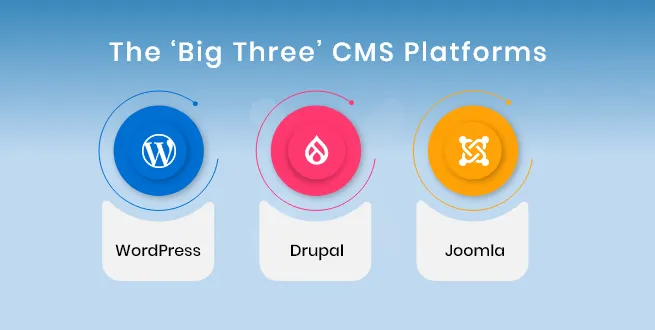
There are very many CMS platforms available online. The market is, however, dominated by three major players - WordPress, Drupal and Joomla. Together, these three dominate 85% of the CMS market.
WordPress is the most popular of the three because it is both user-friendly and open source. Furthermore, WordPress has roughly 50,000 plugins available, making it a very versatile tool. WordPress is perfect for users with very little technical knowledge that need to set up a basic website.
Drupal is also an open-source platform but is more complex than WordPress. The main drawcard is that Drupal allows for more robust web experience. It’s best for sites that require the organisation of complex data, like ones that need to accommodate a community of users.
Joomla offers a mix between the user-friendly features WordPress and the more complex aspects of Drupal. Joomla is versatile while still being relatively easy to use. It is ideal for setting up e-commerce stores or social networking platforms.
The golden rule of landing pages is to “keep visitors on the page”. Generally, you have put effort, time, and resources into getting your users to the page, so you don’t want them to click away before they convert. Any external linking to social media or other pages can distract visitors from following through with the CTA.
It might then feel contradictory to speak about CMS for landing pages. If we ‘zoom out’ and look at the internet as the vast interconnected data stream that it is, we begin to understand that web traffic does not come in silos. There is no ‘one’ path that a user follows to get to a particular page, your landing page included. It seems foolish not to maximize traffic by directing flow from your website to your landing page and vice-versa.
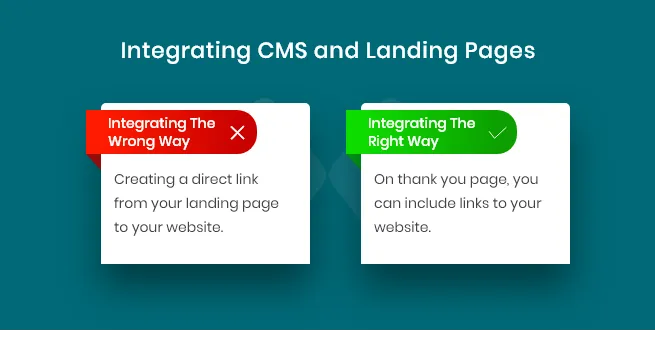
There is definitely a wrong way to connect your website and your landing pages. Creating a direct link from your landing page to your website, for instance. As we have mentioned, this could drive traffic away from your landing page before the user can convert. Anything that hinders conversion is bad.
Send Customers from Your Landing Page to Your Website
After a lead is generated, they should be redirected to a thank you page. This page allows you to extend the contact time between your brand and your new customer. On this thank you page, you can include links to your website - giving your customer access to the rest of your website to explore your brand.
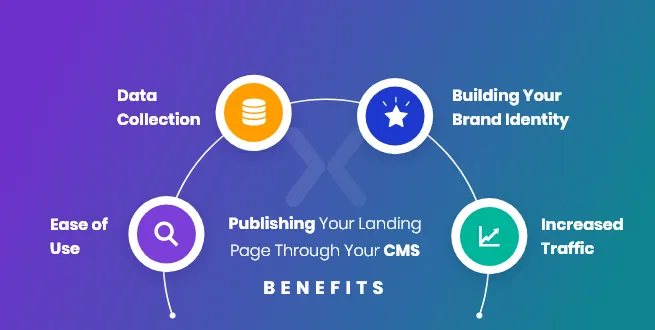
You can publish your landing pages through your CMS platform. There are several advantages of using CMS for landing pages, which we will discuss.
The main purpose of CMS is to allow people with limited technical abilities to create websites. The main benefit of these platforms is that they require little to no coding knowledge. CMS platforms, particularly WordPress, have a versatile range of plugins available, which allow the user to perform a wide selection of functions such as data analysis, data asset management, and multilingual translation with little technical experience.
Additionally, you can build the form you include in your landing page with a CMS. The data collected can be submitted via an API to the CMS. The embedded form can then be automatically updated in the CMS.
Users that visit your website have already shown interest in your brand. This makes them ideal candidates for conversion. For example, if you’re trying to drive traffic to your webinar registration page, PPC ads and social media ads can only get you so far. Visitors to your website are probably already interested in the topics you’re discussing, so adding a link from your website to the landing page could increase registrations.
Consistency is key when building a brand. When you think of leading global brands, their branding automatically comes to mind. That’s because it’s consistent. In fact, 63% of shoppers indicate that brand consistency influences their buying. When building your web presence you need to channel this consistency.
Designing your website and landing pages with the same software helps to maintain this brand consistency. A major advantage is that the domain name for your landing pages and website will be the same. Additionally, web design elements will be the same when using the same design platform.
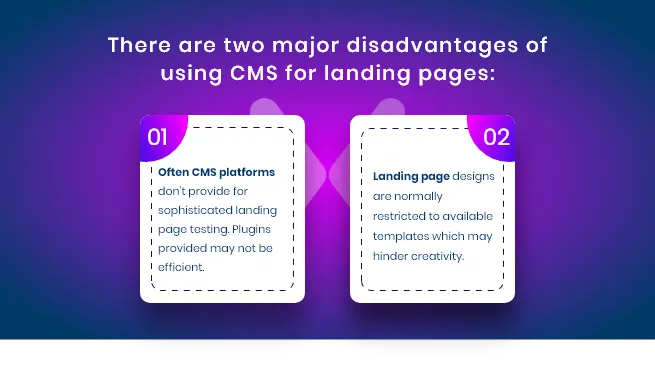
There are two major disadvantages of using CMS for landing pages:
Often CMS platforms don’t provide out of the box sophisticated landing page testing. Plugins provided may not be efficient.
Landing page designs are normally restricted to available templates which may hinder creativity.
There are several landing page builders available online. As we mentioned, three of the most popular are Unbounce, Instapage and LeadPages. Each one boasts a host of features, but the basic features are similar.
The main selling point of a landing page builder is that they are simple to use, and no technical knowledge of coding is required. Furthermore, easy drag-drop interfaces with built-in templates require minimal effort and allow for quick development. In our agency, we use Unbounce as a CMS for landing pages, although we don’t use templates ourselves we design & build landing pages from scratch.
More sophisticated features help maximise conversion, these include - built-in A/B split testing and marketing integrations. Technical benefits, due to external hosting, can include improved page speed and performance. Some platforms also support Google AMP out of the box.
Some landing page builders can plug-in into CMS systems, allowing you to get the best of both worlds. This combines the benefits of publishing via CMS with the ease of using a landing page builder.
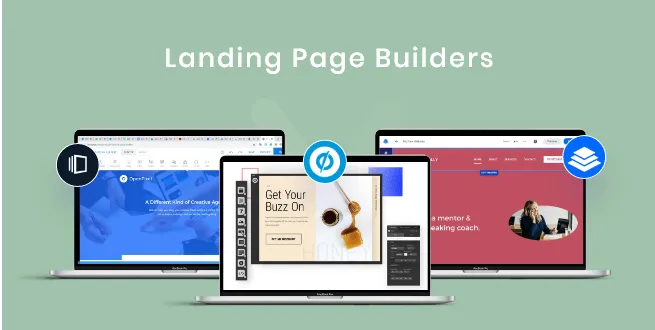
The biggest advantage of hosting landing pages via a platform vs CMS hosted landing pages is that landing page builders are less susceptible to hack attacks.
In our experience, websites built on Wordpress can get compromised, due to inherent nature of Wordpress being Open-source. However, paid campaigns are not impacted as they are hosted on stand-alone systems.
There are some drawbacks though. Businesses generally use multiple landing pages - one for each campaign. Landing page builders cannot make global edits. So in case if you want to make an update to your ‘Main Template’ you will need to manually update all pages.
The URLs of your pages are also likely to be different as they are hosted either via a subdomain or Platform domain.
Finally one final negative, using a separate landing page builder to publish your CMS makes it more difficult to create an integrated marketing strategy. Directing traffic from your website to your landing page and tracking visitor behaviour between landing pages and websites is more difficult when using a builder.
While both CMS and landing page builders have their advantages, using CMS platforms for your landing pages helps to create a more integrated marketing strategy.
The golden rule of landing pages is “don’t make redirection easy”. Redirection or in other words distraction can destroy conversion, and for this reason, it’s not a good idea to link your landing page and website directly. A much better option is redirecting leads to a thank you page which then directs traffic to the main website.
CMS platforms make it easier to integrate your landing pages with your website, helping to develop brand identity through consistency.
Landing page builders on the other hand offer an easy-to-use platform for designing and building landing pages. There are added optimization features as well as the advantage of fast loading pages and performance. The main disadvantages are the inability to globally edit multiple landing pages, lack of consistency with your other online platforms, and differences in domain names.
Landing pages are an essential part of any digital marketing campaign. The platform you use to design them is equally as important. Although landing page builders and CMS platforms both have several advantages, the CMS platform offers much more in terms of integration of your online platforms.
Related Articles:
Landing Page Lead Generation: Guide To Generate Business Leads
How Landing Pages Affect Quality Score Calculation on Ad Platforms
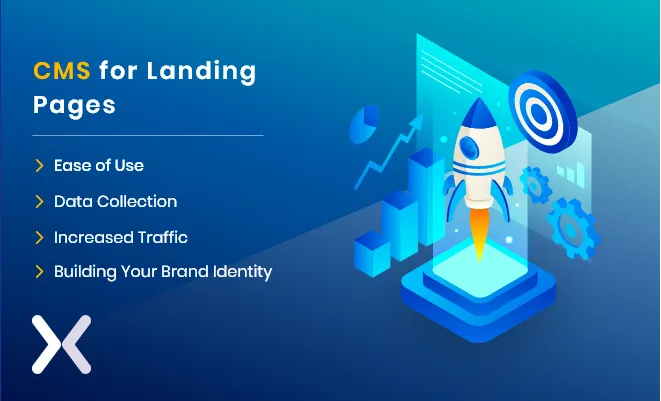
Drive More Sales or Leads With Conversion Focused Websites and Landing Pages
Get Started.webp)
Video content is one of the most powerful tools in modern marketing. It has the ability to capture...
Building a high-ticket coaching funnel for an expertise-driven brand requires a very different approach than traditional marketing funnels....
Get quality posts covering insights into Conversion Rate Optimisation, Landing Pages and great design